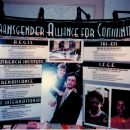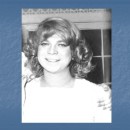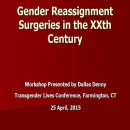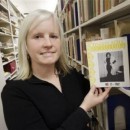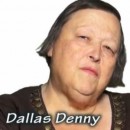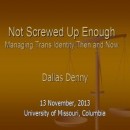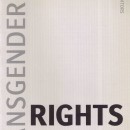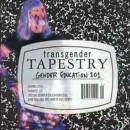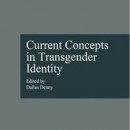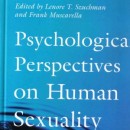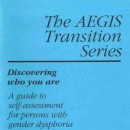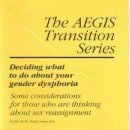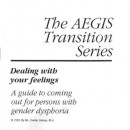How to Do Effective Gender Communication
Gender Education and Advocacy is a new national non-profit organization with twin missions of education and nonpolitical advocacy in the areas of health and media. By focusing on these areas, GEA seeks to improve the lives of all gender-variant people, regardless of their sexual orientation or individual identities.
Read MoreGender Education Training for the New Millennium (2001)
As a movement, the time has come for us to prioritize our public gender education efforts in order to remove this stigmatization and restore our basic human dignity.
Read MoreIn the Beginning: How My Photos of 1950s Crossdressers Inspired a Hit Show on Broadway (2014)
In 2013 Andrea was visiting our own Miqqi Gilbert at Miqqi’ s home in Toronto and Miqqi showed her Hurst and Swope’s book. Andrea immediately realized she had taken and developed most of the photos in the book.
Read MoreCreating Community: A History of Early Transgender Support in Atlanta (2015)
In which I provide an illustrated and incomplete history of transpeople in Atlanta, ending around 1994.
Read MoreDangerous Curves: The Trouble with Injectable Silicone (2014)
Today silicone injections are occurring in epidemic proportions. Typically, large amounts (liters, sometimes) are administered by non-licensed and usually non-medically trained “practitioners” who use big-bore needles to pump large quantities of non-medical grade silicone into virtually every part of the body.
Read MoreAll We Were Allowed to Write (2014)
Before 1994 or so, transpeople were excluded from our own literature. We authored no textbooks and had no book chapters or articles in professional journals. What we could get published, at least from the 1950s onward through 1990 or so, were autobiographies.
Read MoreGender Reassignment Surgeries in the XXth Century (2015)
The techniques used in modern plastic surgery—including GRS—were developed almost exclusively by this man, who is considered the father of plastic surgery. His name was Harold Gillies.
Read MoreDismantling the Gender Binary (2015)
This are the notes for my keynote delivered at Transgender Lives: The Intersection of Health and Law, Farmington, CT, 25 April, 2015
Read MoreMy Self-Nomination for the 2015 Trans 100 List
This year I nominated myself for the 2015 Trans 100 list.
Read MoreAll We Were Allowed to Write (2014)
There are hundreds and hundreds of trans bios. In this presentation I describe and discuss some of them.
Read MoreDining With the Privileged (2014)
How is it that those who dine most lavishly manage to pay less than they ought?
Read MoreFantasia Fair 2013: The Movie
I appear briefly in this promo for the trans conference Fantasia Fair.
Read MoreTrans Bodies, Trans Selves (2014)
Jamison Green and I prepared a 30,000-word chapter on trans representations in the media. As things sometimes go in the book publishing business, it morphed into a series of media spotlights. Anyone interested in a great chapter on trans people in the media?
Read MoreThe Language of Gender Variance (2001)
This paper presents data from a national survey of attitudes of transpeople about various and assorted terms which had been used to describe them. The survey was done in 1998. Ten years later we again surveyed transpeople about their preference for terminology. The resulting paper is now under review for consideration for publication in the International Journal of Transgenderism.
Read MoreInterview for Monika Kowalska, The Heroines of My Life (2014)
Polish transwoman Monika Kowalska publishes a brilliant blog in which she prints interview of people she admires. She’s been at it since January, 2013 and has interviewed more than 100 trans women. I’m happy to be one of them!
Read MoreTrans Pioneers to Lead University of Victoria Symposium (2014)
Dallas Denny is one of four pioneers of the trans rights movement featured at Moving Trans History Forward, a three-day symposium starting today at the University of Victoria.
Read MorePreserving Trans History: A Short History and Suggestions for the Future (2014)
Clearly the mere establishment of a trans archive at the University of Michigan has resulted in donations in the form of money and materials—and clearly the university itself is proud of the collection and is motivated to grow it. And clearly, the collection has grown since 2000.
Read MoreInterview for University of Missouri Maneater (2013)
This is an audio recording of an interview I gave to reporter Elizabeth Loutfi of the school paper Maneater following my keynote during Trans Awareness Week at the University of Missouri at Columbia.
Read MoreNot Screwed Up Enough (2013)
I was honored to be asked by The Triangle Coalition to present this keynote. I was treated like royalty while at the University of Missouri at Columbia.
Read MoreInsideOUT Radio 11/13/2013
On 13 November, 2013, I was a guest on the University of Missouri radio show InsideOut.
Read MoreThe Campaigns Against Transsexuals: Part I (2013)
Today I’m talking about a remarkable—and successful—plot to end sex reassignment in the United States. Yes, right here in River City! The year was 1979.
Read MoreTransgender Communities in the United States in the Late Twentieth Century (2006)
What were the historical roots of this larger transgender community, and how did it so quickly arise and so quickly grow? What kept these communities apart for so many years, and what eventually brought them together?
Read MoreFirst Contact: Transgender Community Educational Efforts in the Late Twentieth Century (Keynote, 2009)
Why is trans education important? Well, ask yourself if there was ever a time in your life when you badly needed information about who you were, what you could do about it, who you could be, and how you could plan your life. If you’re like me, you were at one time or another, and maybe even for half your life, desperate for such information.
Read MoreCurrent Concepts in Transgender Identity (1998)
Current Concepts is an edited textbook; I was privileged to be the editor. The text consists of emerging ideas about trans* issues authored by physicians, psychologists, sociologists, anthropologists, historians, and advocates, many with decades of experience in the field. The work is in part an homage to Richard Green and John Money’s 1969 edited text Transsexualism and Sex Reassignment, which established early treatment protocols. Both Green and Money contributed chapters to Current Concepts. Of Current Concepts, Of just how much things have changed, Green wrote in his chapter, “I am struck at the outset that the biggest change with this new text may be that it is edited by a transsexual.”
Read MoreBlack Telephones, White Refrigerators: Rethinking Christine Jorgensen (1998)
If she changed the world for nontranssexual people, Jorgensen had an even more profound effect on people who were like her. Her story galvanized many transsexual men and women into seeking the same sort of medical treatment. In 1953, Christine Hamburger published a paper in which he described receiving 465 letters from men and women, desperately begging for a “sex change.” Neither he, nor anyone else, was prepared to oblige them.
Read MoreGender Variability, Transsexuals, Crossdressers, and Others (2007)
This draft differs in small way from the printed version. I was unable to scan the printed pages without breaking the book’s spine. The chapter appears here courtesy of Praeger Publishers.
Read MoreComing of Age in the Land of Two Genders (1997)
I was honored to be asked to make a contribution to this book of autobiographies of famous sexologists.
Read MoreTerminology, Gender Diversity, and the Primacy of Gender (2000)
I’m grateful to Dr. Sandra Cole for allowing me to be second author of this chapter.
Read MoreGender Identity: From Dualism to Diversity (2007)
This draft differs in small ways from the printed version. I was unable to scan the printed pages without breaking the book’s spine. The chapter appears here courtesy of Praeger Publishers.
Read MoreDiscovering Who You Are (1991)
Much has changed since I wrote this series of booklets in the early 1990’s. Not only have I become older and hopefully wiser, but there has been a revolution in the way gender identity issues are viewed. The term “gender dysphoria,” with its implication of mental illness, does not accurately describe the transgender process for all of us, and for most of us, we are only dysphoric for a relatively short time.
Read MoreDeciding What to Do About Your Gender Dysphoria (1991)
Much has changed since I wrote this series of booklets in the early 1990’s. Not only have I become older and hopefully wiser, but there has been a revolution in the way gender identity issues are viewed. The term “gender dysphoria,” with its implication of mental illness, does not accurately describe the transgender process for all of us, and for most of us, we are only dysphoric for a relatively short time.
Read MoreDealing With Your Feelings (1991)
This was the first of a series of booklets I wrote while executive director of nonprofit American Educational Gender Information service.
Read MoreA Word from the Editor (Chrysalis, 1991-1998)
Here are the Word From the Editor/Publisher columns from the various issues of Chrysalis.
Read MoreThe Shark in the Swimming Pool (1993)
Confronted, Willis claimed the increasing tensions within the group were the fault of the various group members, and certainly not his. He was insistent he was not the problem.
Read MoreMy Three Transitions (1996)
Ten years earlier, at age 18, the answer to the question “Will I someday pass?” would have been an unequivocal yes. Ten years in the future, at age 38, the answer would have been an unequivocal no. Looking at my thinning hair and hardening features, the best answer I could come up with was an unequivocal maybe.
Read MoreIn Search of the “True” Transsexual (1996)
In dealing with my own transsexualism. and in working with hundreds of other transsexual people, it has become clear to me that transsexualism, as conceptualized by Benjamin, is an invented way of looking at a much larger transgender phenomenon, and that the process of sex reassignment is but one way of dealing with that phenomenon.
Read MoreAriadne Kane Interviews Dallas Denny (2005)
I chanced across this video, which was made by LipTV in 2005. I had had no idea it was available online. In it, I talk with Ariadne Kane about Fantasia Fair and a little about myself.
Read MoreProdigal Son (1994)
My feelings about the rejection have ranged from bewilderment to sorrow to anger, but the overriding emotion, the one which came first and which has lasted longest, is disappointment. It reinforces my belief that my family was just an assortment of people I drew by chance, like one draws a roommate in a college dorm. My family is made up of imperfect human beings, unable to love unconditionally, unable to rise to a challenge, unable to communicate. I’m sad for them, for I gave them a wonderful challenge, and they have failed to rise to it.
Read MoreAn Interview with Anne Bolin (1993)
Is the feminist movement a threat? You’d better believe it. It’s a big threat. When my male students get concerned in my classes on gender and sex, I tell them. “You bet it’s a threat. It’s going to change everything.” But what do you get from it? You get partnerships in life. You’re both on equal footing. You can work it out with your partner according to your different likes and dislikes, strengths and weaknesses.
Read MoreMini-Interview with Dr. Michel Seghers (1993)
Dr. Michel Seghers is a plastic and reconstructive surgeon who practices in Brussels, Belgium. The following interview was conducted on Sunday, 4 October, 1992, at the Southern Comfort convention in Atlanta, Georgia.
Read MorePsychology as Art; Psychology as Science; Psychology as Pseudoscience (1992)
Holly Boswell did a good job of critiquing Glenn Humphrey’s doctoral dissertation. I was outraged enough by Humphrey’s analysis to critique it myself. I was not gentle.
Read MoreAn Interview with Dr. David Gilbert (1992)
Dr. David Gilbert is a plastic surgeon and microsurgeon who is co‑founder of The Center for Gender Reassignment in Norfolk, Virginia. His wife, Deborah, is a registered nurse, and Coordinator of the Center. Plans were to interview both Dr. and Mrs. Gilbert at Southern Comfort, but Mrs. Gilbert became ill shortly after arrival, and was still under the weather on Sunday afternoon, the last possible time for the interview. Dr. Gilbert, who was obviously worried about his wife, nevertheless gave us what we believe to be the finest interview on sex reassignment surgery which has ever appeared outside, and perhaps inside, the pages of a medical journal.
Read MoreThe Care and Feeding of the Neovagina (1992)
Those who are lucky, and who have chosen wisely, will end up with neovaginas which are virtually indistinguishable from natural vaginas. And guess what? They will have most of the disadvantages of natural vaginas: susceptibility to infection, sanitation problems, increased vulnerability to STDs—everything but menstruation (and pregnancy, which is only a disadvantage under certain conditions).
Read MoreAn Interview with Carolyn Cossey (1992)
Caroline has dealt maturely and wisely with a burden that generally only those who do not pass well have to face—identity as a “known transsexual.” To show our support, we hosted a reception for her at Atlanta’s Petrus night club (the same place where she was given Mayor Jackson’s award) in October. We presented her with a nonrescindable award for service to the gender community and welcomed her to our advisory board.
Read MoreResults of AEGIS Survey on Community Building (1998)
As AEGIS was winding down in preparation for rebaselining as Gender Education & Advocacy, I mailed a questionnaire to members, asking them to rate the services we provided. As you will see, respondents identifying as providing some sort of professional service to transsexual and transgendered people ranked items quite differently from respondents who did not identify as providing services. \
Read MoreThe Price of Inclusion (1998)
With transgender acceptance by the larger gay/lesbian/bisexual community now the norm, the question must be asked: can and will existing G/L/B organizations take on the support of transsexual and transgendered folks? Can they do a better job than the existing transgender organizations to meet our needs? And more importantly, should we hitch our wagon to organizations which were not interested in meeting our needs in the past and may not be interested in the future?
Read MoreMeeting the Information Needs of Transsexual People (1998)
We’ve been an important voice in transforming the treatment setting from one in which we were grateful for and unquestioning of whatever courtesies and services professionals chose to give us to one in which we have the same rights as other consumers—believe it, in 1990, this was not the case.
Read More

